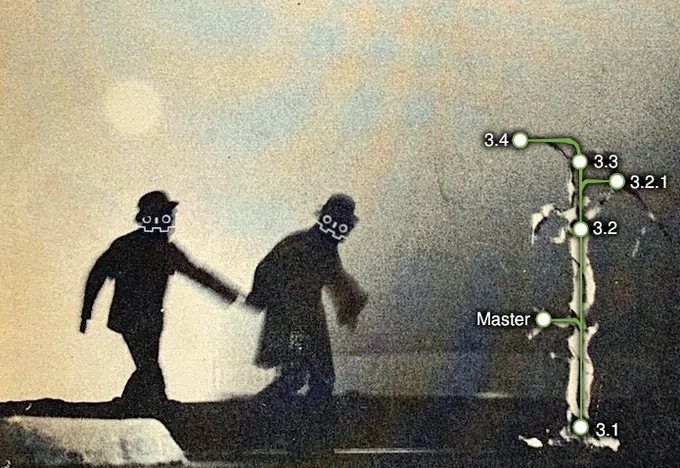Value of Waiting
"Vladimir: What do we do now?
Estragon: Wait.
Vladimir: Yes, but while waiting.
Estragon: What about hanging ourselves?
Vladimir: Hmm. It'd give us an erection.
Estragon: (highly excited). An erection!"
― Samuel Beckett, Waiting for Godot
Godot Engine is a prime example of a project that excels in the art of waiting. It manipulates the notion that those who exercise patience often reap the greatest rewards. Some people say that the name “Godot” shouldn’t be taken seriously, as it doesn’t necessarily represent the values behind the project. This might be true under other circumstances, but in the case of Godot Engine, the name “Godot” has a tangible meaning and suggests a peculiar sense of worth.

Godot's original slogan (2023): "The game engine you've been waiting for." Source: WebArchive
For those who are not familiar with the origin of Godot, the engine’s name is derived from the tragicomedy “Waiting for Godot” written by Samuel Beckett:

Picture by Juan Linietsky. Source: X/Twitter
According to the lead developer of Godot Engine, Juan Linietsky, the name represents the never-ending wish of adding new features in the engine, which would get it closer to an exhaustive product, but never will1. Here’s a quote from Juan about “Waiting for Godot”:
In my mind, the most beautiful aspect about Beckett’s “Waiting for Godot” is that for every cast and staging it’s like an entirely different play, as both actors and direction each end up having their own unique interpretation of the original script.
In my mind, the most beautiful aspect about Beckett's "Waiting for Godot" is that for every cast and staging it's like an entirely different play, as both actors and direction each end up having their own unique interpretation of the original script. pic.twitter.com/EVnkhsMNFo
— Juan Linietsky (@reduzio) November 26, 2021
Hopefully it should be clear by now that the choice of name is intentional. Taking Juan’s analogy further, it becomes clear that people who use Godot and contribute to its development are expected to have a different interpretation of Godot’s approach. The irony is that this expectation is obvious only to its creator and to those who have actually seen the play. Here’s another quote from Juan about Godot’s name2:
In a bizarre twist of fate, at some point and well into the development of the engine, we played a video game with a character that formed that connection (bonus points to anyone who figures it out), so the engine is also named in honor to that. This is good, because the original Godot was never supposed to arrive (well, that’s one interpretation…).
This supposed freedom of interpretation may seem appealing to the outsider at first. Who doesn’t value freedom? Unfortunately, this “freedom” as offered by Godot proliferates frivolity. When we combine waiting, ambiguity, and the novelty of adding new features, it engenders a sense of anticipation. Anticipation is the expectation of a reward. This is particularly interesting because uncertainty, a prominent element of the waiting experience, has been shown to sensitize dopamine neurons, which can lead to various behavioral addictions, such as gambling3.
There are also numerous reasons as to why we wait. One of the reasons outlined in the sociological research article “Waiting in Organizations”4 can be readily applied to Godot, especially considering the context of the same analogy used in “Waiting for Godot”.
Anticipatory waiting entails waiting for something that is hoped-for, such as a piece of good news, the delivery of some new equipment, or a colleague’s return from annual leave. In such cases, waiting is likely to be experienced eagerly and as full of hope. However, Vladimir and Estragon’s experiences show how such anticipation may fade over time and turn to cynicism and despair.
Another interesting quote from the research article above is this. It backs up the idea that anticipation can lead to dependency:
Waiting can be conceptualised as an unevenly distributed exercise of power, since it is often the case that the powerless are made to wait for the powerful, the poor for the wealthy. To wait is to be made aware of one’s dependence on another. However, waiting can also be joyous and full of anticipation, even when the waiting takes place in unpleasant physical conditions, such as is experienced by those waiting in crowds for the glimpse of a passing celebrity, or for the launch of the latest i-Phone. Thus, the subjective experience of waiting is likely to vary according to a range of individual and environmental conditions.
There’s a saying: “Desires are nourished by delays.” The longer we wait for something, the more we want it. On the other hand, we can also draw a useful analogy from the teachings of Buddhism:
Desire and ignorance lie at the root of suffering.
Dr. Jordan B. Peterson, a well-known psychologist, also employed a reference to “Waiting for Godot” as an analogy in the talk titled “The Importance Of Pursuing Your Goals,” to describe the futility of waiting to achieving one’s goals5, emphasis mine:
[…] they wait around until it’s Waiting for Godot, until they finally got it right but the problem is you’re too stupid to know when you’ve got it right, so waiting around isn’t going to help. Because even if the perfect opportunity manifested itself to you—in your incomplete form—the probability that you would recognize it as the perfect opportunity is zero […]
The leadership of Godot and its community frequently make enigmatic references to the play, alluding to the line “Mr. Godot told me to tell you he won’t come this evening, but surely tomorrow” from “Waiting for Godot”:
Not today, but surely tomorrow. https://t.co/xMX0pf9NbZ pic.twitter.com/iRSSFjQIly
— Andrii Doroshenko 🇺🇦 (@Xrayez) March 23, 2024
It’s amusing to observe how they attempt to alleviate this adversity by using jokes as a coping mechanism. This is evidenced by the fact that they changed their original Godot slogan, “The game engine you’ve been waiting for,” to the more neutral “Your free, open-source game engine.” Perhaps by imagining that Godot has finally arrived, they try to reconcile the contradiction that way?
Spoiler
Godot never arrived! 🙃

Godot's unoriginal slogan (2024): "Your free, open-source game engine." Source: WebArchive
Conclusion
We have inferred the project’s values from its name alone, and you can see how much information we have got so far. Imagine that you didn’t really intend to convey such a message to the worldwide community! That’s exactly why it’s so important to reveal our values, assumptions, beliefs, and expectations.
This characterization provides a thorough examination of Godot’s values from an objective perspective. From the perspective of a Godot user, these values may go unnoticed, or they may mistakenly believe that having such values do not have any adverse effects on Godot’s development process and the community as a whole. Taking into account all above, Godot’s apparent values go in complete opposition to what this books aims to resolve: ambiguity and uncertainty.
Waiting for Godot inevitably arises from the unfulfilled desires caused by the product’s perpetual state of incompleteness, which anticipates the product that will never be finished (by the very definition expressed by Godot’s lead developer), resulting in an unsatisfactory waiting experience. Waiters for Godot depend on the never-ending novelty of new features being added, or the promise of a “bright” future, which creates a behavioral dependency caused by the fear of missing out (FOMO).
References
Introduction to Godot Engine - By Juan Linietsky, presentation of Godot at RMLL 2015 in Beauvais, France.
Godot history in images! - By Juan Linietsky.
How uncertainty sensitizes dopamine neurons and invigorates amphetamine-related behaviors - By Mike J. F. Robinson1 and Patrick Anselme, Neuropsychopharmacology. 2019 Jan; 44(2): 237–238.
Waiting in organisations - By Catherine Bailey. Time & Society, Volume 28 Issue 2, May 2019.
The Importance Of Pursuing Your Goals - By Dr Jordan B Peterson.